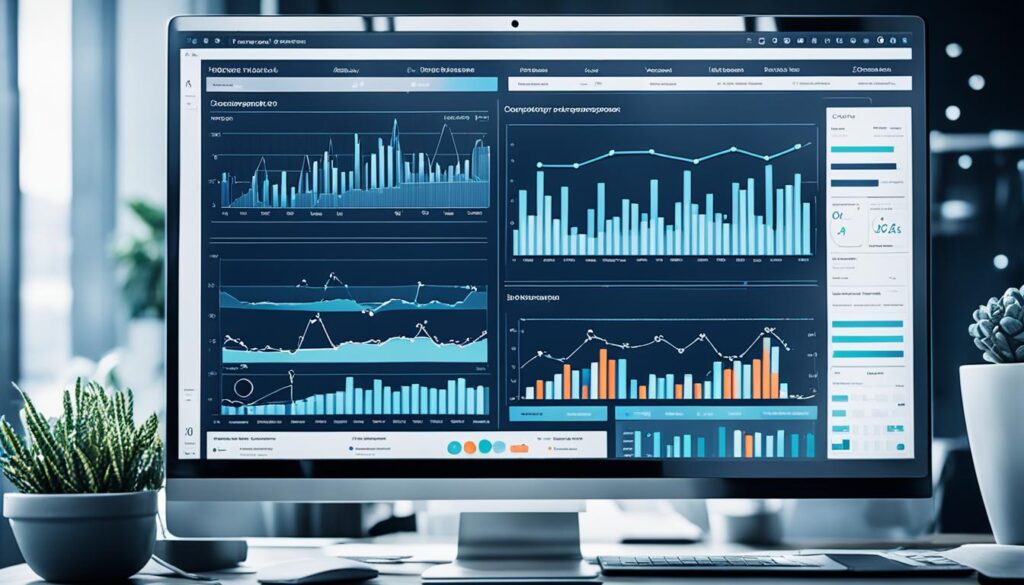Welcome to the world of search engine optimization (SEO). Here, tracking and analyzing metrics are essential for online success. If you own a website or work in digital marketing, monitoring these metrics is a must. It helps identify areas to improve and optimize. Understanding SEO metrics boosts your search rankings and grows your site's organic traffic.
SEO involves keeping an eye on various metrics. Tracking keyword rankings is crucial. It shows how well your efforts are working by checking where your keywords show up in search results. Also, watch your organic click-through rate (CTR). It gives insights on your site's performance in search listings and how attractive your meta descriptions and titles are to users.
Using and understanding SEO metrics helps in making smart, data-backed choices. By analyzing these numbers, you see what strategies are effective and which need work. This approach boosts your website's conversions and search rankings. Thus, more people visit your site organically.
For online success, mastering SEO metrics is key. Knowing why tracking these metrics matters helps optimize your website. This leads to better search rankings and more organic traffic.
Key Takeaways:
- Tracking and analyzing SEO performance metrics is crucial for online success.
- Keyword rankings and organic click-through rate (CTR) are important SEO metrics to monitor.
- Interpreting and utilizing SEO metrics allows for data-driven decision making.
- Effective analysis of SEO metrics leads to increased conversions and improved search engine rankings.
- Mastering SEO metrics enhances online success by optimizing website performance and increasing organic traffic.
Understanding the Importance of Tracking SEO Metrics
Tracking SEO metrics helps us stay ahead online. It gives us insights into our website's performance and how our audience acts. By using this data, we can boost our search engine rankings. This means more people visiting our site naturally and our site doing better.
One big reason to track SEO metrics is to see how visible our website is. Things like where we stand in searches and how many people click on our link matter. This data lets us tweak our site to better attract our target audience.
Watching our keyword rankings tells us if our SEO work is paying off. It lets us see if we're drawing in searchers like we hope. Keeping an eye on organic CTR shows how effective we are in getting searchers to click our link.
"Effective interpretation and utilization of SEO metrics are key in improving search engine rankings and organic traffic."
By keeping up with SEO metrics, we spot areas for growth. We then use this info to smartly tweak our site and content. This can bump up our search rankings and bring in more natural visitors.
A simple table can show how tracking metrics can help. It shows metrics and their impact on site performance:
| Metric | Definition | Impact on Website Performance |
|---|---|---|
| Keyword Rankings | How my site ranks for certain terms. | Being higher means more people see your site, which can lead to more sales. |
| Organic Click-Through Rate (CTR) | How many people click on my site from search results. | A high CTR means your site is relevant and draws more organic traffic. |
| Website Load Speed | How long it takes my site to load. | A quick load time makes users happy, keeps them on your site, and helps your search rank. |
| Conversion Rate | How many users do what you want (like buy something). | A good conversion rate shows your SEO is on point and your site draws people in. |
It’s important to regularly check and interpret these metrics. This knowledge helps us make choices that can improve our site's search rank and bring in more visitors naturally.
Now I know the value of tracking SEO metrics. With this knowledge, I can lead my site to better visibility, more natural visitors, and achieve success online.

Essential Metrics and Analytics for Tracking SEO Progress
Tracking SEO progress involves looking at key metrics. This helps digital marketers understand how well their efforts work. By using analytics, they can tweak their strategies. This leads to better website performance and more visitors from search engines.
1. Organic Traffic
Organic traffic comes from search engine results. It’s vital for SEO success. Tools like Google Analytics show how well your site attracts organic visitors. This data helps make your content more appealing. It leads to more traffic and better SEO results.
2. Keyword Rankings
Keywords are important for search rankings. Monitoring your site's keyword performance shows if your strategy works. Tools like SEMrush and Ahrefs track your keywords. This helps you make smart choices for better SEO.
3. CTR (Click-Through Rate)
CTR shows if your site's snippets and descriptions get clicks. Using Google Search Console, you can see how effective they are. This information helps improve your CTR. Better CTR means more clicks and higher rankings.
4. Bounce Rate
A high bounce rate shows visitors aren't staying on your site. It could mean they don't find what they want. Lowering your bounce rate improves SEO and user satisfaction. It's important for better search results.
5. Conversion Rate
The conversion rate shows how well your site turns visitors into actions. It could be buying something, filling a form, or subscribing. Knowing what works helps optimize your pages. This boosts revenue and SEO.
6. Backlinks
Backlinks come from other sites to yours. They're important for SEO. Tools like Moz help you understand your site's backlink quality. This understanding can greatly boost your site's SEO performance.
7. Page Load Speed and Mobile-Friendliness
Users expect fast sites and mobile-friendly designs. Slow pages and bad mobile experiences lead to fewer visitors. It's key to keep both fast and mobile-friendly. This keeps users happy and improves your SEO.
8. Content Engagement
Metrics like time on page and social shares show how people react to your content. Understanding these helps create content that users love. This boosts your traffic and engagement.
9. Local SEO Metrics
Local businesses need to mind local SEO metrics. These include local rankings and reviews. They help attract nearby customers. Improving these metrics gets more people to visit your store.
Mastering these metrics with the right tools improves your site's performance. It helps reach your SEO goals by increasing traffic, rankings, and engagement.

Conclusion
Tracking SEO performance is key to online success. To do this well, setting specific goals and choosing the right tools is essential. Key aspects to keep an eye on are organic traffic, how often visitors turn into customers (conversion rate), keyword rankings, and click-through rates (CTR).
Heybooster is a top choice for SEO tracking. It offers insights into how often your website shows up in search results as well as tips for boosting organic traffic. It helps you make smarter moves by looking closely at important metrics.
Regular checks on organic traffic, conversion rates, and how your site ranks in search results are vital. This, plus keeping an eye on CTR and the words that don't contain your brand, can really lift your SEO game. With the right strategies and tools, reaching your SEO goals is very doable.
FAQ
Why is tracking SEO metrics important?
Tracking SEO metrics is key for online success. It helps spot areas for making better and optimizing. By doing this, you can push up conversions and boost your search rankings.
What are some key SEO metrics to monitor?
Important SEO metrics to watch are keyword rankings, how easily people click from search results (CTR), natural traffic, conversion rate, bounce rate, and backlinks.
How can I measure keyword rankings and CTR?
To measure keyword rankings, tools like SEMrush and Ahrefs are handy. For CTR, you can keep track of it with Google Search Console.
What is the role of organic traffic in SEO?
Organic traffic is crucial for SEO and can be looked at with Google Analytics. It’s vital to keep an eye on website visibility and organic traffic to better your search rankings.
How can I enhance content strategy and target the right audience?
By checking SEO metrics such as keyword rankings, CTR, and how well your content engages, you can tweak your content strategy. This will help you aim for the right audience.
Why is tracking local SEO metrics important for businesses?
For businesses focusing on local customers, keeping an eye on local SEO metrics is vital. It boosts local visibility, draws in the right kind of visitors, and ups conversions.
Which tools can simplify SEO tracking?
Heybooster is a top tool for easier SEO tracking. It offers a deep look at organic visibility, traffic, conversion rate, keyword standings, and CTR.
How do I select the right tools for tracking SEO metrics?
When picking tools for SEO tracking, be clear about your goals. Choose tools that fit these aims, and check for accuracy, ease of use, and cost.
Why is regularly reviewing and analyzing selected metrics essential?
It’s vital to regularly check and analyze SEO metrics for long-term improvement. This helps in spotting trends and making decisions backed by data, leading to SEO success.











